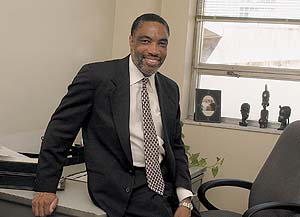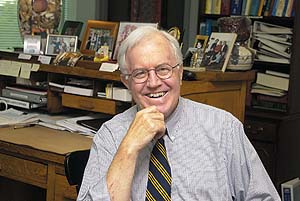|
Profile: County Connections
“My program at RSPH was structured to give me training in administration, health education, and occupational and environmental public health. It prepared me for my work in so many ways,” Benning says. “Even though I may not be an expert in those different areas, I had exposure to all of them. Virtually everyday I draw on some experience or training I had at RSPH and put it to practical use.” Benning provides health services for the Fulton County workforce including pre-employment physicals, disability examinations, and fitness-for-duty tests, and he directs wellness and prevention activities. With an MD from Meharry Medical College in Nashville, he also oversees a variety of medical services for Fulton County residents, working closely with the Fulton County Travel Clinic and the Communicable Disease Branch, among others. The people Benning met while a student at RSPH continue to be a part of his network at the health department. “RSPH gave me exposure to a community of people in public health with whom I now interact frequently. Some are at CDC, and others work for the state. We met as students and now we interact as professionals and colleagues,” he says. Benning also retains other connections to the school. He recently was elected to the RSPH Alumni Board, and he has served as a student mentor. He welcomes students who want practical public health experience to observe activities in Fulton’s Department of Health and Wellness. He particularly encourages minority students to consider public health as a career. “When you think of a health care career, it doesn’t necessary have to be as a physician, nurse, or dentist,” Benning says. “We need to get the word out that public health careers can also be very rewarding—financially, spiritually, and in other ways.” Paul Wiesner: Seasoned director “From my point of view, for an academic public health institution not to have connections with public health departments would be like a medical school having no connections to a hospital and clinic—it wouldn’t make sense,” says Paul Wiesner, MD, director of the DeKalb County Board of Health.
DeKalb’s health board also has an ongoing relationship with the Department of Environmental and Occupational Health. The department offers faculty experts as consultants for problems that arise in the occupational setting. RSPH occupational health residents rotate through the Dekalb County Occupational Health Clinic as part of their training. In his work prior to l989, Wiesner spent 20 years at CDC running several national programs. The move to the DeKalb Board of Health allowed him “to put all the information and experience I’d acquired into practice on a community level.” He now manages a $30 million budget and some 500 employees who serve a culturally diverse population of approximately 700,000 people. During his career at DeKalb, Wiesner has seen public health issues and strategies become more complex. “Previously, we focused almost exclusively on maternal and child health and immunizations, whereas now the breadth of our activities has expanded and our focus has shifted to populations—encompassing pedestrian injuries and fatalities, bioterrorism, SARS, West Nile virus, chronic diseases, health promotions, tobacco use, and more.” Complicated public health issues require partners. “We stand ready to help as a place where connections can be made,” Wiesner says. “And we look forward to an increase in quantity and quality of relationships with RSPH.” By Sherry Baker, director of public relations for the Emory Heart Center
G-Training in Progress | Resisting Superbugs | Foege Fellows | Cancer Collaboration Class Notes & Alumni News | Rollins School of Public Health
Copyright © Emory University, 2003. All Rights
Reserved. |

